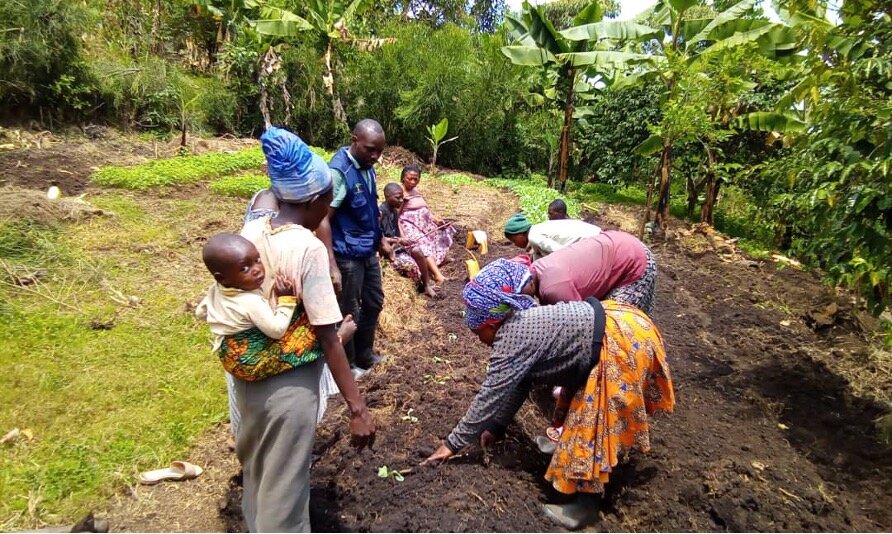By Doreen Kansiime, Immaculate Nakisita, Robin Marsh | Program Leaders, Advisor
First of all, we want to show our appreciation for all of you who participated in the Giving Tuesday campaign last month. We successfully raised funds to support Phase 9 of 1,000 Women’s Gardens – supporting another 75 women-led organic vegetable gardens, 2 community gardens, and our 23 Model Gardener Volunteers. Meanwhile, we are completing the analysis of our Impact Study – building the evidence that we expect with spur other funding opportunities.
Short Videos from Doreen and Nakisita
If you have not had a chance yet, please take a couple of minutes to join Doreen in the short video (see links below - you may need to open in your browser) explaining the impact of 1,000 Women's Gardens, and, likewise with Naki bringing to you the ASRH Young Mothers program in her short video. We’re sure you will feel closer to this work after seeing Doreen and Naki in action!
Impact Study on 1,000 Women’s Gardens – new results
While Doreen, Benjamin, Wycliff and the MGVs have been busy in the field expanding the 1,000 Women’s Gardens integrated program to more communities in Kasese District, the research team in Uganda and UC Berkeley are progressing with the analysis of the Impact Study data. Below are new results to share.
Garden Crop Diversity
Crop diversity is an important criterion for successful organic vegetable gardens to manage climate and market risks, and, even more so, for a healthy mix of vegetables for home consumption. Of the 100 target households, the average is six crops per garden, with min and max of 3 and 9, respectively (Table 1). Interestingly, the adopter gardeners (who are not officially part of the program but have learned from their neighbors, e.g. are indirect beneficiaries), on average are growing 4 to 5 crops during the season. The impact of 1,000 Women’s Gardens is multiplied by the large number of ‘adopter’ gardeners throughout the 52 villages in Kasese District where 1,000 Women’s Gardens operates.
The most commonly grown vegetables (by over 70% of target gardeners) are eggplant, dodo (spinach), African eggplant, cabbages, tomatoes and sukumawiki (kale), a good mix of vitamin-rich green leafy vegetables and marketable/local cuisine crops (see Garden Crops Grown figure). Gardeners are learning to save seeds for most of their garden vegetables to allow growing from season to season with minimal expense for new seeds. Over 70% of target gardeners produce a surplus and sell vegetables a few months of the year.
Home Vegetable Consumption
Another striking research finding is the increase in vegetable consumption by the family before and after beginning to garden (Table 2). Whereas 86% of families ate vegetables only every two weeks or less ‘before’, now the majority eat vegetables twice daily, with significant positive impacts on nutritional status and overall health, especially for young children. For the adopter the gardeners, the results are also encouraging.
Early Evidence of Transformative Change among Young Mothers
The ASRH Gatherings for Young Mother Gardeners program is advancing on multiple fronts to help 500 adolescent mothers cope with stress and stigma and advance their personal and livelihood goals. Our holistic approach is providing evidence that cost-effective but sustained individual attention and socialization – facilitated by Young Mother Volunteers (YMVs), can turn around desperate situations fairly quickly.
Monitoring data from the YMVs show a few examples:
The YMs meet weekly to save and have a sharing on their home life, family planning and other SRH topics. Through this, young mothers have restored the hope they had lost. They can now feel free to talk about pregnancy related topics and how best to prevent the pregnancy including the best family planning method to use.
YMs prepared their gardens as they wait for the season to start. They cleared the gardens, applied mulches, raised beds while monitoring the nursery beds. They were guided by the 1000 Women's gardens team. The young mothers prepared their community garden as well.
Young mothers plan to start joint projects like poultry keeping, piggery and goat rearing. Young mothers were advised
o start saving groups to help them save some money to reach their dreams as well as reducing on the levels of depending on their partners and relatives for basic needs.
Naki summarizes….
Through educational sessions with different topics conducted in the year, young mothers have learnt a lot. There is a great improvement in preventing unplanned pregnancies, gardening skills have been improved, the health status of the young mothers and their children has improved, sanitation and personal hygiene as well. Most importantly, the financial status of young mothers has improved. Young mothers now feel the impact of being hard working and owning money independently. They feel transactional sex can be done away with.
We invite our friends and supporters to send feedback on how we might improve our program via the GlobalGiving email: projecthelp@globalgiving.org, and mention 1,000 Women’s Gardens for Health and Nutrition. We would so appreciate your advice, feedback and encouragement!
Many thanks again to all our partners – readers, donors, supporters, advisors. This excellent and important work depends on all of you.
Warm regards,
Doreen, Naki, Robin and Jostas with Rebecca Gerny
Links:
Project reports on GlobalGiving are posted directly to globalgiving.org by Project Leaders as they are completed, generally every 3-4 months. To protect the integrity of these documents, GlobalGiving does not alter them; therefore you may find some language or formatting issues.
If you donate to this project or have donated to this project, you can receive an email when this project posts a report. You can also subscribe for reports without donating.
Support this important cause by creating a personalized fundraising page.
Start a Fundraiser





